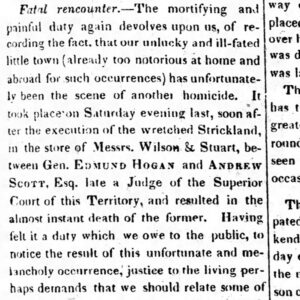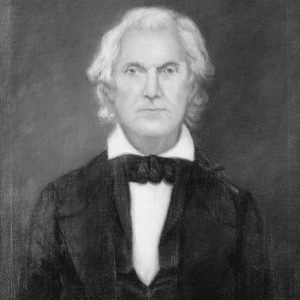calsfoundation@cals.org
Andrew Horatio Scott (1789–1851)
Andrew Horatio Scott was one of the first judges of the Superior Court of Arkansas Territory (predecessor to the Supreme Court of Arkansas) by virtue of appointment by President James Monroe. He was the first governmental official to report for duty at the village of Arkansas Post on July 4, 1819, and assisted in putting into operation the laws of the territory. He served as Circuit Court Judge for the first District and was the first county judge of Pope County. Scott County, created in 1833, was named in his honor.
Andrew Scott was born on August 6, 1789, to Andrew Scott, a Scottish emigrant weaver and Elizabeth Ferguson in Hanover, County, Virginia. In 1808, he arrived with his parents, two brothers, and three sisters in Ste. Genevieve, Missouri. In this city, he read law under his brother, John, and on November 5, 1811, married Eliza Jones.
He became politically active in 1812, with the creation of Missouri Territory, of which Arkansas was a part. Scott was the first clerk of the House of Representatives, Territory of Missouri, serving two terms. In 1815, he moved his family to Mine-A-Breton (Potosi, Missouri), a Spanish lead mining town. He used his political influence to establish the Potosi Academy and served with his father-in-law as trustee. In 1819, Territorial Governor William Clark commissioned him sheriff of Jefferson County, Missouri. On March 3, 1819, President Monroe appointed Andrew H. Scott as a Superior Court Judge for the newly created Territory of Arkansas, and he promptly relocated his family.
In October 1820, the Arkansas Territorial General Assembly passed a legislative act to remove the territorial capital to Little Rock (Pulaski County). However, the Scott family continued to reside at Arkansas Post for a time and enjoyed the social activities. According to William F. Pope, in April 1824, while Scott and fellow Superior Court judge Joseph Selden enjoyed a game of whist (a card game) with two ladies, an incident occurred wherein Scott felt that Selden had insulted a lady and demanded that he apologize. Selden refused and was challenged to a duel. He accepted. Ultimately, an apology was forthcoming and the matter thought resolved. However, contention between the judges continued to simmer, and a few weeks later, on May 26, Selden died at the hand of Scott, on the east bank of the Mississippi River across from Helena (Phillips County).
The duel proved costly to Scott’s career. Though he survived an attempt to remove him, in 1827, his reappointment to the high court was denied in Washington DC. This same year, Scott was a candidate in a special election to fill the vacancy created for a delegate to Congress by the dueling death of Henry W. Conway in 1827. He only garnered 116 votes. His low vote count was credited to his own dueling experience.
On May 31 of the following year, Scott confronted Edmund Hogan and accused him of lying about Scott during the campaign. The verbal argument escalated into a shoving match, during which Hogan struck Scott, knocking him down. Scott drew a spear from his walking cane and thrust it into Hogan’s body, mortally wounding him. Scott was charged with murder but later acquitted from charges as he was ruled to have acted in self-defense.
In 1827, the Circuit Courts were organized in Arkansas Territory. On April 11, Scott was appointed to the First District. He removed to lands formerly owned by the Indians (which later became Pope County) and laid out a town named Scotia. On November 2, 1829, Pope County was created, and Scott was appointed the first county judge. In 1830, Scotia became the first permanent county seat.
Irrespective of his dueling record, Scott is acknowledged as one of the most distinguished figures in pioneer Arkansas history. His knowledge and clearness of mind rendered in published judicial opinions give him lasting legal prominence in the state of Arkansas.
Scott’s last official act was to enumerate the 1850 Pope County census. He died unexpectedly at Norristown (Pope County) on March 13, 1851. He was first buried next to his wife at Dover (Pope County). In 1881, his son, John R. Homer Scott, removed their bodies to the Oakland Cemetery at Russellville (Pope County).
For additional information:
Herndon, Dallas T. Centennial History of Arkansas. Chicago: The S. J. Clarke Publishing Company, 1922
Pope, Judge William F. Early Years in Arkansas. Little Rock: Frederick W. Allsopp, 1895.
Ross, Margaret. Arkansas Gazette: The Early Years, 1819–1866. Little Rock: Arkansas Gazette Foundation, 1969.
Wanda Gray
Waldron, Arkansas
This entry, originally published in Arkansas Biography: A Collection of Notable Lives, appears in the CALS Encyclopedia of Arkansas in an altered form. Arkansas Biography is available from the University of Arkansas Press.
 Law
Law Louisiana Purchase through Early Statehood, 1803 through 1860
Louisiana Purchase through Early Statehood, 1803 through 1860 Edmund Hogan Death Story
Edmund Hogan Death Story  Andrew Scott
Andrew Scott 




Comments
No comments on this entry yet.